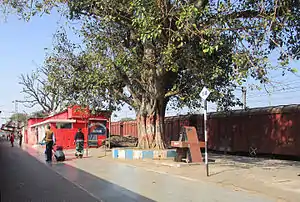Koderma district
Koderma district is one of the twenty-four districts of Jharkhand state, India, and Koderma is the administrative headquarters of this district.
Koderma district | |
|---|---|
District of Jharkhand | |
 | |
 Location of Koderma district in Jharkhand | |
| Country | India |
| State | Jharkhand |
| Division | North Chotanagpur division |
| Headquarters | Koderma |
| Government | |
| • Lok Sabha constituencies | Kodarma (shared with Giridih and Hazaribagh districts) |
| • Vidhan Sabha constituencies | 1 |
| Area | |
| • Total | 1,500 km2 (600 sq mi) |
| Population (2011) | |
| • Total | 716,259 |
| • Density | 480/km2 (1,200/sq mi) |
| Demographics | |
| • Literacy | 68.35 per cent |
| • Sex ratio | 949 |
| Time zone | UTC+05:30 (IST) |
| Website | http://koderma.nic.in/ |
Koderma district was created on 10 April 1994, after being carved out of the original Hazaribagh district. It is currently a part of the Red Corridor.[1]
Geography
Koderma is bordered by Nawada district of Bihar on the north, the Gaya district of Bihar on the west, the Giridih district of Jharkhand on the east, and the Hazaribagh district of Jharkhand on the south.
Koderma is surrounded by forests. The main rivers of the district are Barakar, Barsoi and Sakri. Dhawajadhari Pahar is a hill dedicated to lord Shiva, where at Mahashivratri many devotees assemble to worship the god. Chanchal dham (hill) which is located 12Km away from Nawadih railway station and 30 km from Koderma junction railway station, is dedicated to Maa Chanchalni. Many devotees gather here for the festivals of durga pooja, ramnavmi, akhari pooja, etc to worship Chanchalni Maa to fulfill their desires.
Koderma district is richly endowed with natural resources. Quartz, feldspar, asbestos, blue stone, white stone and moon stone are the minerals found here. At one time, Koderma was considered as the mica capital of India.
Administration
Blocks (Mandals)
Koderma district consists of six Blocks. The following are the list of the Blocks in Koderma district:
Economy
In 2006 the Indian government named Koderma one of the country's 250 most backward districts (out of a total of 640).[2] It is one of the 21 districts in Jharkhand currently receiving funds from the Backward Regions Grant Fund Programme (BRGF).[2]
Education
There are several schools and degree colleges in Koderma, notable institutions include:
- Capital University, Jharkhand, established by Jharkhand Govt in 2018, in Chitragupta Nagar, Koderma, Jharkhand
- Grizzly Vidyalaya, a CBSE-affiliated residential School, located in the Damodar Valley
- Jharkhand Vidhi Mahavidyalaya
- Kailash Roy Saraswati Vidya Mandir, Jhumri Telaiya (Vidya Bharti Foundation)
- Sainik School, Tilaiya[3] (boys-only residential school, established on 16 September 1963)
- Saraswati Shishu Mandir (established 1984), run by the Bal Bharti Samiti of Rashtriya Swayamsevak Sangh
Transport

The district has three major towns - Domchanch, Jhumri Telaiya, Koderma. Koderma, Jhumri Telaiya are located along National Highway 31, which connects Ranchi and Patna. Koderma Railway station is on the Grand Chord railway line, which connects Kolkata and Delhi.
Health
Hospitals
- Sadar hospital, Koderma
- Jay Prakash Hospital, Chitragupt Nagar, Jhumri Telaiya, Koderma
- Hope hospital, Jhumri Telaiya, Koderma
- Gayatri Hospital, Jhumri telaiya, Koderma
- Holy Family Hospital, Koderma
Divisions
The district comprises six blocks: Koderma, Jainagar, Markacho, Satgawan, Chandwara and Domchanch.
The Vidhan Sabha constituency of this district are Kodarma, Barkatha and Barhi, which are part of Koderma and Hazaribag Lok Sabha constituency respectively.
Demographics
According to the 2011 census Koderma district has a population of 716,259,[4] roughly equal to the nation of Bhutan[5] or the US state of Alaska.[6] This gives it a ranking of 500th in India (out of a total of 640).[4] The district has a population density of 427 inhabitants per square kilometre (1,110/sq mi) .[4] Its population growth rate over the decade 2001-2011 was 32.59%.[4] Kodarma has a sex ratio of 949 females for every 1000 males,[4] and a literacy rate of 68.35%.[4] Schedule Castes (SC) constitutes 15.2% of the population and 1% are Scheduled Tribes.
At the time of the 2011 Census of India, 49.66% of the population in the district spoke Khortha, 43.47% Hindi, 4.69% Urdu and 0.52% Santali as their first language.[7]
| Year | Pop. | ±% p.a. |
|---|---|---|
| 1901 | 110,697 | — |
| 1911 | 121,094 | +0.90% |
| 1921 | 119,998 | −0.09% |
| 1931 | 142,590 | +1.74% |
| 1941 | 164,578 | +1.44% |
| 1951 | 182,045 | +1.01% |
| 1961 | 215,252 | +1.69% |
| 1971 | 268,836 | +2.25% |
| 1981 | 327,035 | +1.98% |
| 1991 | 419,624 | +2.52% |
| 2001 | 540,901 | +2.57% |
| 2011 | 716,259 | +2.85% |
| source:[8] | ||
References
- "83 districts under the Security Related Expenditure Scheme". IntelliBriefs. 2009-12-11. Retrieved 2011-09-17.
- Ministry of Panchayati Raj (September 8, 2009). "A Note on the Backward Regions Grant Fund Programme" (PDF). National Institute of Rural Development. Archived from the original (PDF) on April 5, 2012. Retrieved September 27, 2011.
- Saiful Haque (2011-11-16). "Sainik School ragging: Jharkhand High Court issues showcause notices to government, principal". India Today. Retrieved 2012-04-02.
- "District Census 2011". Census2011.co.in. 2011. Retrieved 2011-09-30.
- US Directorate of Intelligence. "Country Comparison:Population". Retrieved 2011-10-01.
Bhutan 708,427
- "2010 Resident Population Data". U. S. Census Bureau. Archived from the original on 2011-08-17. Retrieved 2011-09-30.
Alaska 710,231
- 2011 Census of India, Population By Mother Tongue
- Decadal Variation In Population Since 1901